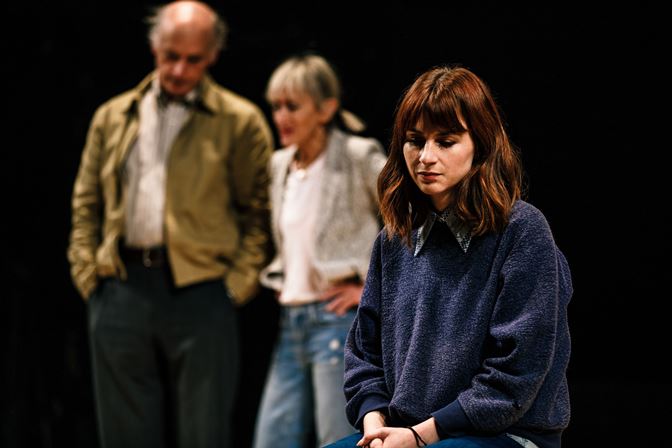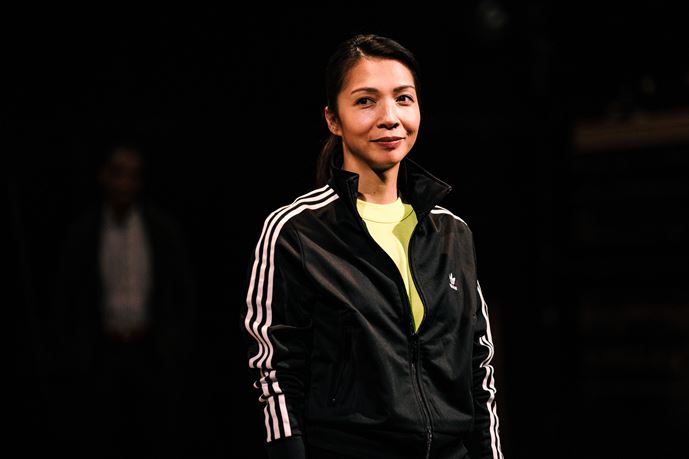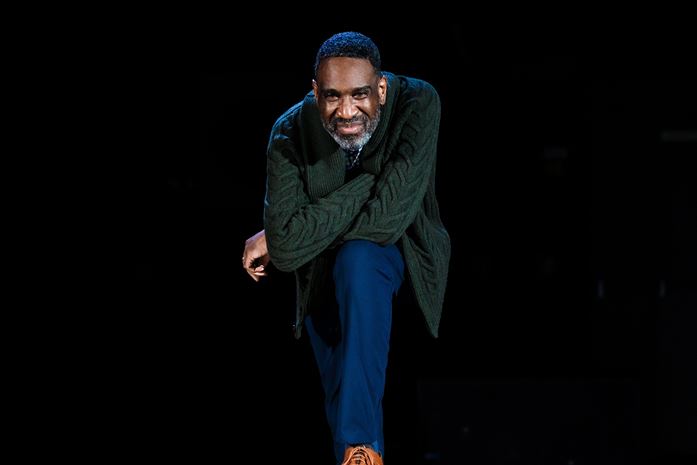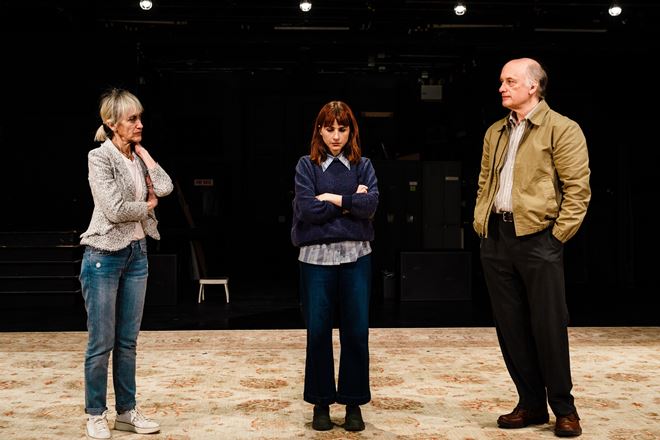Manhattan Theatre Club’s world premiere of The Best We Could (a family tragedy), written by Emily Feldman in 2018, and now playing a limited pandemic-delayed Off-Broadway engagement at New York City Center, is a non-linear memory play framed in a meta-theatrical device inspired by Thornton Wilder’s iconic Our Town, but with a decidedly post-modern theme that addresses a hot-button issue of our time. Directed by Daniel Aukin, the shocking tragedy – punctuated with dark humor and employing a stark minimalist design that requires you to use your imagination as the actors move around the mostly empty stage – begins and ends with devastating phone calls from a mother to her adult daughter. In between, as the story unfolds, recollections are enacted and secrets exposed through the central conceit of a father-daughter cross-country road trip that lays bare a journey into familial dysfunction, the limits of friendship, and the ramifications of inappropriate behavior.

A powerful cast of five brings all the conflict and emotion, sardonic laughs and heartrending drama, distinctive personalities and individualized responses, to their portrayals. It’s all done in the context of following the precise stage directions and narration of Maps, who breaks the fourth wall, directly addressing the audience with the preliminary curtain speech, introducing the characters and their backgrounds, telling us which additional roles she’s assuming in the play, calling for shifts in lighting, and calmly but firmly instructing the cast on where to move and what to do. It’s an almost god-like fatalist presence that calls to mind Shakespeare’s famous words: “All the world’s a stage/And all the men and women merely players;/They have their exits and their entrances,” and it’s played to perfection by Maureen Sebastian.

Aya Cash, as the unsuccessful 36-year-old daughter Ella, who lives in California, works a survival job as a yoga instructor, “doesn’t even have a dishwasher,” and wrote an unpublished book “about the inner emptiness of being a person living in a war-like society that, on some level, believes it has no future,” is laughably argumentative, angry, outspoken, and critical in her interactions with her mother, derisive comments to her beloved father about the stops made on their cross-country trip, and heated confrontations with his long-time friends, rendering herself largely unlikable in her own triggered recollections. Constance Shulman as her mother Peg, at home in New Jersey, is also annoyingly “nagging,” insistent, and combative, and not always forthright. It’s acerbically funny until it isn’t, as the gaps in the non-sequential scenes begin to come together late in the play, more of their situations and underlying feelings are revealed, and Peg avers, “we did the best we could.”

Frank Wood turns in a masterful multi-layered performance as Lou (Ella’s father and Peg’s husband), an out-of-work senior investigator at a biomedical research institute, who prides himself on his career accomplishments and his social ability to make friends. But he can’t accept the loss of his former status and is actively seeking employment, requesting the help of his old and trusted friend Marc (a pleasant, easy-going, and equivocal Brian D. Coats), whom he met in graduate school, introduced to his wife (an American Francophile with an over-the-top feigned French accent – one of the roles filled by Maps), and stops to visit in Denver on the trip with Ella. It all comes to a head when Lou is passed over for the job and the true reason – viewed differently by each of the characters – is eventually disclosed, serving as a catalyst for the final tragic event.

The disjointed, sometimes confusing, sometimes mundane memories Ella tries to process in her mind’s eye are performed on a stage with just a large carpet, assorted seats and stools, and the unconstructed scenery flats and equipment piled all around in Lael Jellinek’s meta-theatrical set design, informed by Matt Frey’s changing lighting and Kate Marvin’s sound, and costumes by Anita Yavich that are simple and suited to the ages and positions of the contemporary figures. But in The Best We Could (a family tragedy), it’s not just the fourth wall that’s shattered. The play’s bleak and depressing conclusion left me reeling and leaves us thinking about the generational changes and gender-based differences in perception and reaction to untoward situations with colleagues in the workplace, and conduct that ultimately destroys everyone involved and devastates those closest to them, as seen in Feldman’s provocative work.
Running Time: Approximately 90 minutes, without intermission.
The Best We Could (a family tragedy) plays through Sunday, March 26, 2023, at Manhattan Theatre Club, performing at New York City Center, Stage I, 131 West 55th Street, NYC. For tickets (priced at $79-99, including fees), call (212) 581-1212, or go online. Masks are required in the theater.





